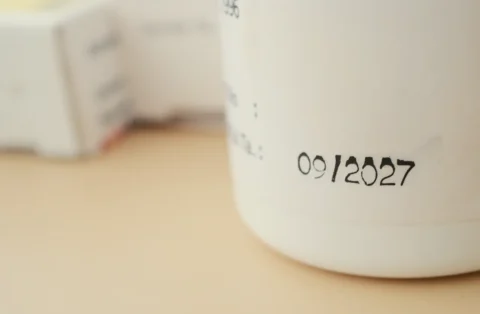What you’ll learn
We’ll cover what happens during barbiturate withdrawal, which symptoms to watch for, and why medical supervision is important for safety. We’ll also discuss different treatment approaches and how QuickMD can support you during recovery after you complete detox.
If you or someone you care about is thinking about stopping barbiturates, you might be worried about what withdrawal will be like. Stopping any substance takes courage, and it’s not a path you have to walk alone. In fact, barbiturate withdrawal can be dangerous without medical supervision and shouldn’t be done alone. Symptoms can escalate from nausea and anxiety to life-threatening complications like seizures and delirium. But with the right support, it’s manageable and safe.
We’ll walk you through what to expect during withdrawal, how long symptoms usually last, and how working with a licensed provider in person can help you stay safe and comfortable through the process.
What are barbiturates?
Barbiturates are sedative-hypnotic medications that were commonly prescribed for conditions like anxiety or insomnia. Today, due to their risk of dependence and overdose, providers are more likely to prescribe benzodiazepines instead. However, barbiturates are still used for anesthesia and to treat seizures.
Whether taken therapeutically or recreationally, regular use of barbiturates can lead to tolerance and dependence. The brain’s calming system (the GABA pathway) becomes attuned to the barbiturates and reduces its own natural GABA activity and calming signals. This means that, over time, the brain adjusts to a new way of functioning and depends on barbiturates to feel calm and balanced.
If you suddenly stop taking barbiturates after regular use, your brain’s calming system is thrown out of balance. The barbiturates it depended on to maintain that balance are no longer there, and your brain needs to learn how to compensate again. Until then, withdrawal symptoms like nausea, anxiety, or irritability occur. Sometimes severe and life-threatening symptoms such as seizures or delirium can develop, which is why stopping barbiturates should be done under medical care.
Why barbiturate withdrawal can be dangerous
When you suddenly stop taking barbiturates, the brain ramps up production of stimulating brain chemicals (like glutamate and norepinephrine) to compensate and restore balance. As a result, your nervous system kicks into overdrive. Anxiety and irritability can turn into tremors, spiked blood pressure, and elevated heart rate. Without proper medical oversight, this can escalate into extreme confusion, delirium, and seizures. Barbiturate withdrawal works similarly to alcohol or benzodiazepine withdrawal in this way.
Under medical supervision, you can safely get off barbiturates by tapering down the dose over time. Depending on the severity of dependence, this may happen in an outpatient setting or in a specialized treatment facility with 24-hour monitoring. Providers often substitute a long-acting barbiturate like phenobarbital, which makes it easier to taper slowly and reduces the risk of dangerous symptoms like seizures.
What are common barbiturate withdrawal symptoms?
Barbiturate withdrawal symptoms can affect you physically and psychologically. We’ll go over the common symptoms of both and flag the severe warning signs to watch for that require emergency care.
Physical symptoms
The physical symptoms of withdrawal can range from uncomfortable to almost unbearable. Sweating, shaking, nausea, and muscle aches are your body’s way of adjusting to functioning without barbiturates. But don’t worry! These symptoms are only temporary, and working with a provider to monitor them can help prevent any complications during this transition.
| Symptoms | What is happening | Why it happens |
| Tremors | Involuntary shaking or trembling that starts in the hands. This happens early and can be severe, requiring medical monitoring. | The nervous system is overcorrecting after losing the calming effect barbiturates provided. |
| Sweating | Sudden, drenching sweats regardless of room temperature. | Surges of adrenaline and norepinephrine trigger this response. |
| Nausea | Upset stomach and queasiness. | During withdrawal, the nervous system shifts out of rest-and-digest mode. The change in gut–brain signals tells the body to slow digestion, which can trigger nausea. |
| Vomiting | Can progress from nausea and complicate withdrawal by causing dehydration. | The autonomic nervous system goes into overdrive and irritates the stomach. |
| Increased heart rate | The heart beats faster than usual, sometimes causing palpitations. | The fight-or-flight system raises blood pressure and heart rate. This can become dangerous without monitoring. |
| Muscle pain | Achy, crampy muscles with sore knots from involuntary clenching. | An imbalanced nervous system creates constant muscle tension and tremor activity. |
Psychological symptoms
The psychological symptoms of barbiturate withdrawal can feel frightening. Sleepless nights and relentless anxiety can make you wonder if something is seriously wrong. The truth is, this is normal as the body tries to rebalance itself and create a new baseline. Going through this with a professional can help manage symptoms and remind you that you’re not alone when things feel overwhelming.
| Symptoms | What is happening | Why it happens |
| Anxiety | Feels like a sense of dread, racing thoughts, tight chest, and difficulty concentrating. | The brain’s fear center (amygdala) becomes hyperactive without barbiturate-enhanced GABA to calm it down. At the same time, the brain gets flooded with excitatory chemicals and stress hormones that create a sensation of constant threat even when you’re safe. |
| Restlessness | Pacing, fidgeting, and inability to stay on task. | Fight-or-flight is stuck on and keeps your body tense and ready for action. |
| Irritability | Overreacting to minor annoyances, short fuse, and snapping at people. | The brain is overcompensating after losing the calming effect barbiturates provided, allowing raw emotions to take over. |
| Insomnia | Trouble falling asleep and staying asleep. Could also include night sweats and vivid dreams. | The sleep-promoting GABA system is struggling while the systems responsible for wakefulness are in overdrive. This combination makes sleep difficult. |
Severe or emergency symptoms
Severe withdrawal symptoms are medical emergencies that require immediate care. Seizures, delirium, and extreme confusion mean your brain is dangerously out of balance. Symptoms such as convulsions can happen between 24 and 115 hours (1 to 5 days) after stopping barbiturates, especially if you quit suddenly. If you or someone you’re with is experiencing any of these symptoms, call 911 immediately.
- Seizures: Episodes of sudden, uncontrolled electrical activity in the brain that cause convulsions, muscle rigidity, and loss of consciousness.
Cause: The brain gets used to the calming effect barbiturates provide and slows down its own production of GABA calming chemicals. When the drug is suddenly stopped, the brain becomes overactive, which can trigger seizures.
- Delirium and severe confusion: Extreme disorientation, hallucinations, or the inability to organize thoughts.
Cause: Without barbiturates, the nervous system becomes so overactive that it disrupts your ability to process reality and think clearly.
Typical timeline of barbiturate withdrawal
Barbiturates are classified by how long their effects last: ultra-short, short, intermediate, and long-acting. Withdrawal symptoms can start within several hours of the last dose for shorter- and intermediate-acting barbiturates, while longer-acting types may not show withdrawal symptoms until a day or two later.
| Timeframe and duration from last dose | What’s happening | Common symptoms |
| Within hours to 1 day | For short‑acting barbiturates like pentobarbital, effects last 2 to 6 hours, and the nervous system begins to rebound. | Early mild symptoms of anxiety, restlessness, tremors, sweating, nausea, trouble sleeping. |
| Days 1 to 3 | Symptoms intensify and peak as the brain tries to compensate for lost drug effects with excitatory chemicals. For longer‑acting barbiturates like primidone, withdrawal symptoms may kick in later. | Intensified tremors, insomnia, rapid heart rate, stronger anxiety, agitation, vomiting. Possibility of hallucinations, seizures. Severe delirium also possible during this peak of withdrawal symptoms. |
| Days 4 to 7 | Peak withdrawal symptoms start to ease up. The brain’s nervous system starts rebalancing, but is still vulnerable. | Physical symptoms like nausea and vomiting decline. Anxiety, irritability, and insomnia persist. Risk of seizure decreases. |
| Days 8 to 14 and beyond | Most physical symptoms are largely gone. Psychological and emotional symptoms may linger (protracted withdrawal). | Fatigue, depression, mood swings, anxiety, insomnia, and difficulty concentrating are still present and may last for weeks to months. |
Medical supervision is critical for your safety and comfort throughout this entire timeline. Your provider can adjust your taper, manage symptoms as they arise, and immediately intervene if dangerous complications like seizures develop.
Factors that affect severity
Withdrawal symptoms from barbiturates don’t look the same for everyone. How severe your symptoms are and how long they last depend on several factors. People who have used high doses for extended periods of time or who have underlying health conditions are at greater risk for serious complications. This is why medical supervision with an approach tailored to your unique situation is so important.
Detoxing from barbiturates typically takes 7 to 14 days, depending on:
- The specific substance and how long it stays in your system: Short-acting barbiturates like pentobarbital leave your body faster, which can cause a shorter but more intense withdrawal. Longer-acting barbiturates like phenobarbital take more time to clear out, creating a longer but usually milder withdrawal.
- How long you’ve been taking it: The longer you’ve used barbiturates, the more your brain has attuned to relying on the drug for calmness. This means a slower, medically supervised taper is needed when you stop.
- Your dose: Higher doses cause a stronger dependence because the brain turns down its own calming system more to compensate.
- Your overall health profile: Preexisting mental health conditions like depression or anxiety can intensify psychological withdrawal symptoms. Physical health issues, such as cardiovascular disorders or seizure disorders, also increase the risk of complications.
- The rate of taper from the barbiturate: Quitting abruptly is dangerous and could trigger life-threatening symptoms. A gradual taper under the guidance of a licensed provider is the safest approach.
Managing and treating barbiturate withdrawal
The most important thing to understand about barbiturate withdrawal is that it isn’t something you should try to manage on your own. This isn’t just uncomfortable or unpleasant. It can be genuinely dangerous without proper medical care. Seizures, delirium, and life-threatening complications can develop within days of stopping, especially if you go “cold turkey.” The good news is that medically supervised barbiturate withdrawal treatment can manage the symptoms safely and help you get through this.
Medical detox and monitoring
Medical detox is the safest and most effective way to get off barbiturates. Depending on your situation, this might be inpatient treatment with 24/7 care or a closely supervised outpatient program. Either way, you’ll have licensed providers available to:
- Monitor your progress and vital signs: Blood pressure, heart rate, and temperature are tracked to catch any warning signs of complications early.
- Manage your symptoms: Nausea, anxiety, and insomnia are treated with medication and supportive care.
- Prevent complications such as seizures or dehydration: Your provider can intervene immediately if they see signs of seizures, dehydration, or delirium.
Detox treatment prioritizes safety while keeping you as comfortable as possible as your brain and body adjust. Your medical team will know how to navigate the dangers of barbiturate withdrawal, so you’re not left worrying about what’s normal or what’s an emergency. They’ll also know when and how to adjust your taper depending on how you’re responding.
Supportive care and symptom relief
Beyond tapering, your medical team focuses on keeping your body stable during withdrawal. This means ensuring proper hydration, nutrition, and sleep hygiene. Your provider can prescribe short-term medications to ease uncomfortable symptoms like anxiety or nausea. These supportive measures work together to keep you as comfortable as possible while your brain rebalances. Withdrawal is temporary, and with the right support, you’ll get through this.
Behavioral health and counseling
While recovery isn’t always a straight line, addressing the underlying cause of barbiturate use can be helpful in preventing relapse. Evidence-based options like cognitive behavioral therapy (CBT) and peer support have all been shown to help people maintain their recovery. Therapy and counseling can help you understand your triggers, develop healthier coping skills, and increase your chances of long-term recovery.
Long-term care and follow-up
Once you’re through detox, recovery continues with therapy, medical follow-up, and building healthy routines. After the most intense withdrawal symptoms ease up, you may notice lingering symptoms like anxiety, difficulty sleeping, or low mood. This is sometimes called protracted withdrawal, and it’s a normal part of your brain healing.
With ongoing support from counselors, doctors, and peer groups, these symptoms lessen over the weeks and months ahead. Recovery takes time, but your brain does rebalance, and you start feeling more like yourself again.
Getting barbiturate withdrawal support
Because barbiturate withdrawal can be dangerous and requires close medical supervision, detox should always be managed in person at a hospital or licensed detox facility. QuickMD does not prescribe barbiturates or provide direct detox treatment for barbiturate withdrawal.
However, after you complete detox, online care can be an important part of your recovery journey. After detox, our telemedicine platform can help you:
- Explore counseling options
- Access peer support groups
- Get treatment for everyday medical needs like UTIs, respiratory infections, skin issues, etc.
Frequently asked questions about barbiturate withdrawal
How long does barbiturate withdrawal last?
Withdrawal symptoms usually start within hours to a day of your last dose, peak during days 1-3, and begin easing up around days 4-7. Most acute physical symptoms resolve within 7-14 days, though some psychological symptoms like anxiety, mood swings, and fatigue can persist for weeks to months. Your specific timeline depends on which barbiturate you were taking and how long you used it.
Is it safe to detox from barbiturates at home?
Generally, no. Medical supervision is essential due to the high risk of life-threatening complications like seizures, delirium, and cardiovascular failure. A provider can safely taper you from the drug properly and manage your symptoms as they arise, significantly reducing the risk of dangerous rebound effects.
What medications are used during barbiturate withdrawal?
The first choice is a long-acting barbiturate (usually phenobarbital) administered through a gradual taper to prevent severe symptoms. Your provider may also prescribe supportive medications for nausea, anxiety, or insomnia.
How long does it take to get barbiturates out of the system?
It depends on which type of barbiturate you were taking. Short-acting barbiturates like methohexital clear your system within a day or two, while long-acting ones like phenobarbital can take several weeks to fully eliminate.
To find out the specific timeline for a particular barbiturate, look up its half-life, and then plug that number into this drug half-life calculator to estimate how long it takes to clear your system. Keep in mind, even after the drug leaves your body, your brain needs additional time to rebalance, which is why some withdrawal symptoms last longer than the drug’s physical presence.
What does abrupt withdrawal of barbiturates cause?
Abruptly stopping barbiturates is extremely dangerous and can trigger severe and potentially fatal reactions. This includes seizures, hallucinations, delirium, and cardiovascular collapse. Tapering under medical care is the only safe approach.




